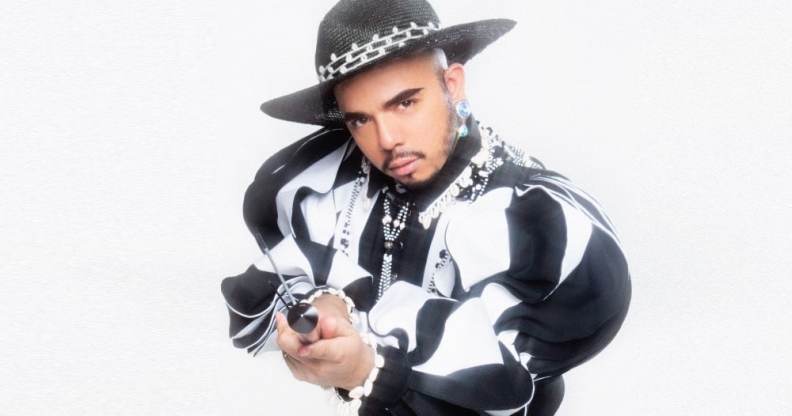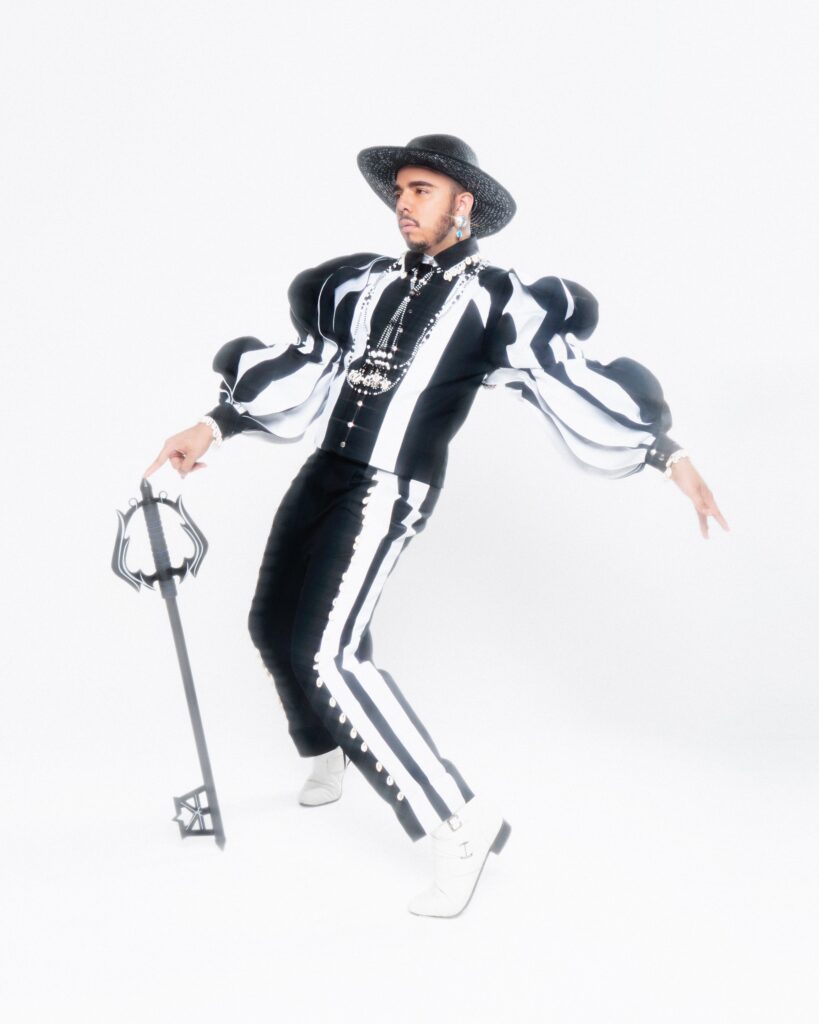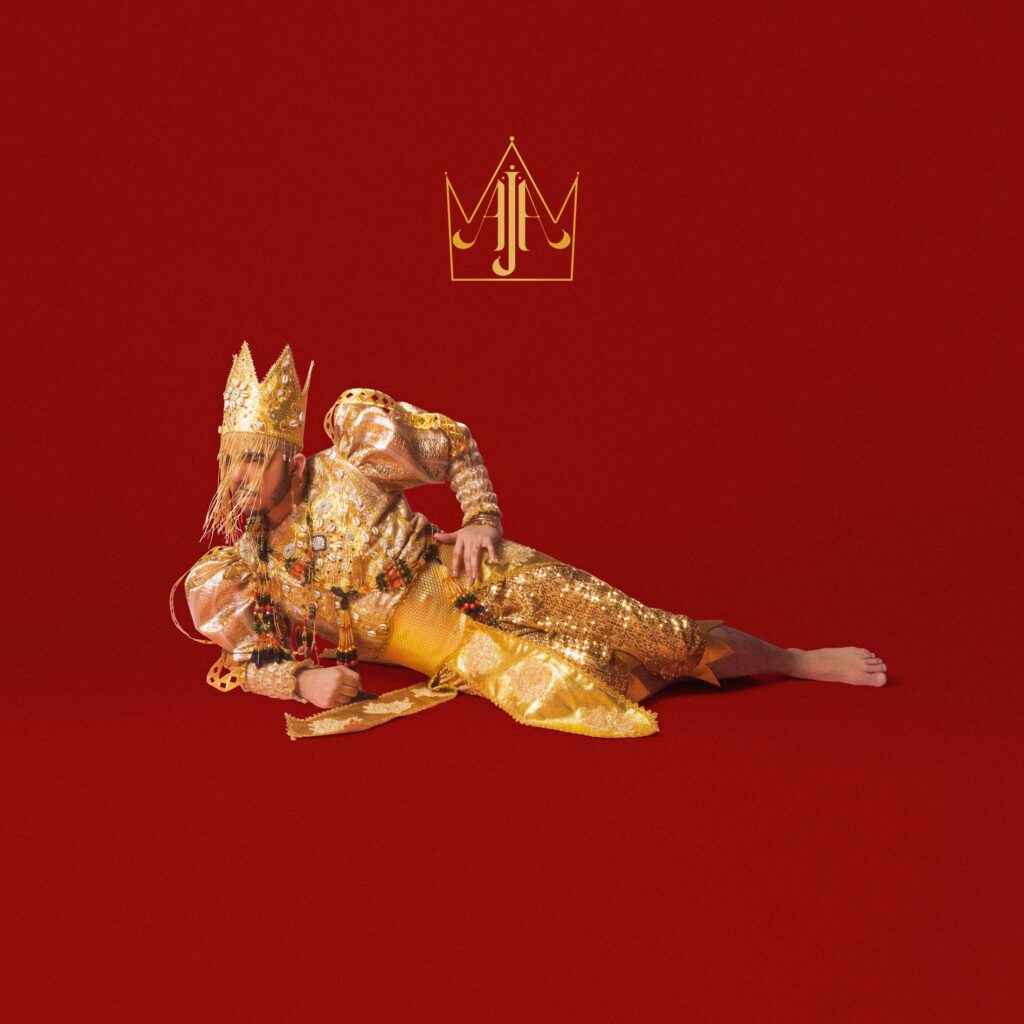Aja on cutting the puppet strings, OnlyFans and spirituality

Aja is back with a new albumm. (Supplied)
Aja rose to fame on RuPaul’s Drag Race, but no longer uses the term drag queen to describe what they do.
“It’s really just me in makeup,” they told them in 2018. “It’s me, it’s just an extension of my gender identity [they’re non-binary], and it’s my expression.”
That expression has never been as powerful as on their new album, Crown. It’s a “huge story”, Aja says, “of my struggle, realising my worth, my potential”. They talk about their rise to prominence off the back of Drag Race, and of “being lost, not knowing where to go, dealing with being suicidal, having to have people talk me off the ledge and being spiralled into intense judgement from millions of people that I didn’t know”.
“But also, I talked about how I rose above that,” they add. “I make a lot of analogies about about puppets and the strings and cutting them.”
It’s a rap album that blends hip-hop with drumming, chants and singing that references Aja’s Lukumi faith and heritage. As well as fame and its effects, the lyrics touch on class, race and sexuality. It’s the start of a new chapter for Aja, as they explained to PinkNews.
What does the title, Crown, mean?
The idea of the crown is so multifaceted. It’s a representation of my past as a drag artist and of my current state as a musician. It represents royalty and ultimately, it’s a journey. Nobody’s just born with it.
It sounds like this is very much about you carving out your own lane.
Yes, I don’t think a lot of people with my sort of platform would do the things that I’ve done with it. I think some people have maybe looked at me as a little ungrateful. But I think, why have such a beautiful, big platform and not use it to branch out? You have to utilise the tools you’re given. I’m just not someone who likes to stay stagnant. I like to stay dynamic. If you stay in one spot the whole time, people are not going to be excited. And especially me, as an artist, I’m not going to be excited about that. I want excitement. I want the thrill.
Has it been challenging, stepping out like that?
It’s been very challenging, actually. The demographic of Drag Race, for example, is not necessarily in alignment with what I’m doing. Because right now I’m sort of at the intersection of queer culture and Black culture. Queer culture does align with Drag Race, but I think that, especially with there being such a large amount of racism in the Drag Race fan base, that does contribute to people not really giving [my music] a chance.
Let’s be honest, a lot of queer people who are not people of colour don’t really indulge in hip-hop or rap music, or they may feel that rap or hip-hop music has a history of being homophobic, so people may be less inclined. But I think that representation is very important and I think that visibility is important. If we don’t have anybody from our community doing that, we’ll never have that that intersection, we’ll never have that visibility within hip-hop and there’ll never be that respect that we really want.

Aja. (Supplied)
Regardless, a lot of people who watch Drag Race, they fall in love with the makeup, the look, they don’t really fall in love with the person behind it. So a lot of times people are just fans of the art, not the artist. As I learned that, for me, drag was not really a vehicle – I wasn’t really performing it, I was living it – I really did want to be respected more as just an artist and as a person. I felt like there was this hesitancy because it was like, ‘Oh, you’re not Aja anymore’. But I am.
How do those intersections inform the album?
The big underlying theme in the album is the Black spirituality. I come from an Afro-Latino community where we are heavily indulged in the African diasporic practices, and especially myself being a priest in the Lukumi faith, we’re considered crowns.
I’m a priest of Oshun. People may know of Oshun from hearing Beyoncé say she has Oshun energy and stuff like that, but I’m a real priest of Oshun. I don’t know if she is or not, that’s none of my business. Some people choose to be very secretive with their spirituality. Understandably, society tends to be a little rigid with Black spirituality. But for me, personally, I let it all hang out there. I’m just like, here you go, this is what it is. So I wanted to wear the traditional gala outfit [on the Crown cover], I wanted everyone to see how royal and rich and abundant it looked.

Aja on the Crown album cover. Supplied)
How does your spirituality intersect with your queerness?
To some people it may seem strange, because some people think that queerness is not really aligned with traditional African culture. But there’s a lot of queer people in this practice. And there’s a lot of, not even tolerance, but acceptance. Everybody knows that there’s a lot of gay Lukumi priests. I feel like that is just awesome that I can bear that and be honest with the public, with myself and with my community, and I can have other people who are elders who are also queer, be proud of that. So that’s really how that plays such a big role for me.
You’ve been open about using OnlyFans to pay for the recording of the album and how you were empowered by that work.
I feel like society has this very colonial way of looking at things sometimes. We’re taught to be ashamed of sexuality. We’re taught to be ashamed of our bodies. We’re taught that too much sex is bad, not enough sex is bad. There’s just so much s**t to worry about, why can’t we just be free?
I’m no stranger to sex work. And to me, I feel like a platform like OnlyFans allows people to safely do sex work and get money for it that’s actually more than you would get if you were putting your life on the line. When I said a lot of those things, I wanted people to know that this wasn’t just an opportunity for me to make coin. I wanted people to see at it as: ‘Hey, look, I’m actively partaking in sex work, and I’m proud of it. And if you’re not into it, maybe you should reevaluate how society might have told you that something is wrong, that really isn’t even that bad.’
At the end of the day to each their own, some people are going to have opinions regardless and some things are just not for everyone. And that’s completely understandable and OK. But I just feel like nobody should be told that they’re disgusting, or desperate – because I got a lot of comments from people that were like, ‘You’re desperate, this is disgusting, oh she’s broke.’ To me, that type of behaviour is toxic. When I see someone who’s willing to bear their body, which I think is so sacred, it’s powerful. You’re kind of saying: f**k society, f**k everything. It’s rebellious. And it’s kind of punk. And I think that’s cool.
Aja’s Crown is released 21 May.

